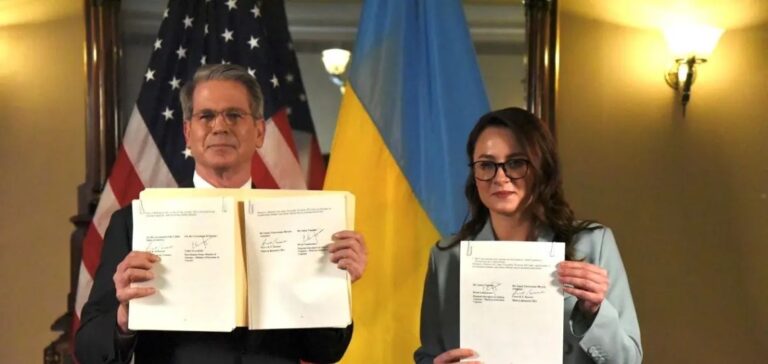The American and Ukrainian governments have formalised the signing of an economic partnership agreement during a ceremony in Washington, creating a joint investment fund. This financial mechanism is designed to support Ukraine’s economic reconstruction and includes direct investments in projects linked to the extraction of mineral, oil and gas resources.
The agreement stipulates that the projects financed through this fund will focus on the development of Ukraine’s extractive sector, without any transfer of ownership. Ukrainian Minister of Economy Ioulia Svyrydenko stated that the Ukrainian state retains full sovereignty over its resources, including subsurface reserves, and that all decisions regarding exploitation will rest solely with national authorities.
A mixed financial structure between Kyiv and Washington
The fund will be jointly managed by representatives from both governments. It is based on equal financial contributions and aims to attract additional capital from public and private international actors. United States Secretary of the Treasury Scott Bessent emphasised that this agreement directly responds to the substantial financial and military assistance granted to Ukraine since 2022, estimated at several tens of billions of dollars.
This new legal and financial framework enables American investors to operate in strategic sectors of the Ukrainian economy with legal safeguards, though it does not include military protection clauses. The agreement lacks provisions for security guarantees in the event of renewed hostilities or military escalation in affected regions.
Intense negotiations over control of resources
Negotiations leading to the document were marked by disagreements concerning the nature of U.S. involvement. An earlier version of the agreement, proposed in February, was rejected following a public dispute between Presidents Volodymyr Zelensky and Donald Trump. A revised version, deemed more balanced, was eventually accepted after weeks of diplomatic discussions.
The Ukrainian administration insisted that previously allocated assistance should not be recognised as debt. Prime Minister Denys Shmyhal clarified that the agreement excludes earlier military or economic funding from Ukrainian government obligations. This position was accepted by the American side, although it was criticised by some U.S. congressional representatives.
Growing interest in Ukraine’s rare earth reserves
Ukraine is regarded as a territory with strong potential for the extraction of rare earths and critical metals. However, many deposits are located in areas currently under Russian military occupation, making near-term exploitation difficult. The United States has nonetheless expressed long-term strategic interest in these resources, particularly in the context of diversifying supply chains.
President Donald Trump stated that access to these resources represents a form of return on U.S. support. According to the U.S. Treasury, the presence of American stakeholders on the ground would strengthen the country’s economic prospects while serving as a tool of economic leverage within broader peace negotiations.
Security impact and ongoing military context
Shortly after the agreement was signed, the Russian military launched a drone strike on the city of Odessa, killing two civilians and injuring five others. The operation was part of a series of attacks across various regions of the country, including the Sumy, Kharkiv and Donetsk oblasts. These developments highlight the continuing challenges of securing infrastructure required for large-scale economic projects.
The agreement must still be ratified by the Ukrainian parliament before it can enter into force. In the meantime, several economic and diplomatic stakeholders are closely monitoring the fund’s implementation, particularly regarding access conditions to deposits and guarantees offered to foreign investors.






















